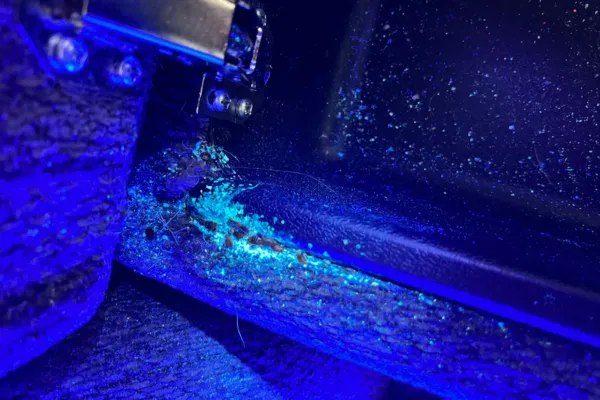
BLOGS
BLOG

What Black Lights Reveal About Bed Bug Infestations in Your Home
When the lights go out, most homeowners like to think of their bedroom as a sanctuary—a place of rest, comfort, and safety. But for some, the night brings unwelcome guests: bed bugs.
What’s worse is that these pests are experts at hiding, often invisible to the naked eye during the day. That’s where black lights come in, exposing the creepy truth crawling just beneath the surface. If you’ve never seen bed bugs under black light, prepare yourself—it’s not a pretty sight.
In this article, we’ll dive deep into:
Why bed bugs are so difficult to detect.
How black lights reveal their hidden world.
The dangers of ignoring an infestation.
Practical prevention tips every homeowner should know.
How Valley Wide Pest Control can help reclaim your peace of mind.
The Truth About Bed Bugs
Bed bugs aren’t just a minor nuisance. These tiny, blood-sucking insects are masters of stealth. Roughly the size of an apple seed, they hide in the tiniest cracks and crevices: inside mattress seams, under baseboards, behind headboards, and even in the folds of your couch.
While their bites aren’t known to transmit diseases, the real danger lies in their:
Rapid reproduction: A single female bed bug can lay hundreds of eggs in her lifetime.
Resilience: Bed bugs can survive for months without feeding.
Psychological toll: Sleepless nights, itching, and anxiety are common side effects for homeowners battling infestations.
It’s no wonder the mere mention of bed bugs makes people shiver.
Why Black Lights Are a Game Changer
Most homeowners don’t realize how many bed bugs are hiding around them until they use a black light. Under this ultraviolet glow, traces of bed bug activity light up—shedding skin, droppings, and even the pests themselves become easier to spot.
Black light inspections can reveal:
Fecal spots that fluoresce under UV light.
Cast skins from growing bed bugs.
Clusters of eggs tucked into furniture seams.
Live bed bugs scurrying to escape the light.
Think of it like shining a flashlight into a dark cave—suddenly, the monsters you hoped weren’t there are staring back at you.
The Hidden Dangers of Bed Bug Infestations
Some people think, “They’re just bites, how bad could it be?” But bed bugs bring bigger problems than many realize.
Health Impacts
While bed bugs don’t spread disease, their bites cause itchy, red welts that can lead to skin infections if scratched.
Allergic reactions to bites are also possible, sometimes severe.
Mental & Emotional Stress
Living with bed bugs is emotionally exhausting. Many homeowners report insomnia, stress, and even paranoia—constantly feeling like bugs are crawling on them.
Property Damage
Bed bug infestations often force homeowners to throw away mattresses, couches, and other costly items.
Spreading the Infestation
Bed bugs are hitchhikers. They cling to clothes, luggage, and furniture, spreading from room to room or even house to house.
Ignoring them only makes the problem worse—and more expensive to fix.
Early Warning Signs Homeowners Shouldn’t Ignore
Bed bugs are sneaky, but they always leave behind clues. Watch for:
Small, reddish-brown stains on sheets (from crushed bugs or droppings).
Tiny eggshells or molted skins near furniture seams.
Musty odors in heavily infested rooms.
Itchy bites in clusters or lines, often appearing overnight.
If you notice any of these, don’t wait—bed bugs rarely go away on their own.
Prevention Tips Every Homeowner Should Know
While professional pest control is often necessary for full elimination, here are some proactive steps you can take:
Inspect Used Furniture
Never bring second-hand couches or mattresses into your home without checking them thoroughly.
Reduce Clutter
Bed bugs love hiding in piles of clothes, books, or boxes.
Use Mattress Encasements
Special bed bug-proof covers can trap existing bugs and prevent new ones from entering.
Vacuum Frequently
Pay close attention to baseboards, bed frames, and under furniture.
Be Travel Smart
Hotels are common sources of bed bugs. Always inspect the room, keep luggage elevated, and wash clothes in hot water when you return home.
Why DIY Doesn’t Work
Many homeowners try DIY methods first: sprays, foggers, or essential oils. Unfortunately, these rarely work. Bed bugs are highly resistant to many common treatments, and their ability to hide in deep cracks makes surface sprays ineffective.
In fact, DIY attempts often drive bed bugs deeper into hiding, making infestations worse.
How Valley Wide Pest Control Can Help
At Valley Wide Pest Control, we know how stressful bed bugs can be—and we’ve helped countless Central Valley homeowners eliminate them for good.
Here’s what sets our approach apart:
Comprehensive Inspections: We use professional tools (including black light inspections) to identify every hiding spot.
Targeted Treatments: Our methods go beyond the surface, targeting eggs, nymphs, and adults for complete elimination.
Family-Safe Solutions: Treatments are designed to protect your family and pets.
Follow-Up Visits: Because bed bugs are stubborn, we don’t stop at one visit—we ensure the infestation is fully gone.
Peace of Mind: With over 40 years of experience, we know how to restore your home—and your sleep—fast.
Final Thoughts
Your home should be a place of peace, not panic. But as black lights reveal, bed bugs are often much closer than you think. They may be small, but the problems they bring are huge—ruined sleep, costly replacements, and relentless anxiety.
The good news? You don’t have to fight them alone.
Valley Wide Pest Control is here to help you uncover, treat, and eliminate bed bugs once and for all. Don’t wait until a small infestation becomes a full-blown nightmare—take action today.
© 2024 Valley Wide Pest Control. All rights reserved.

